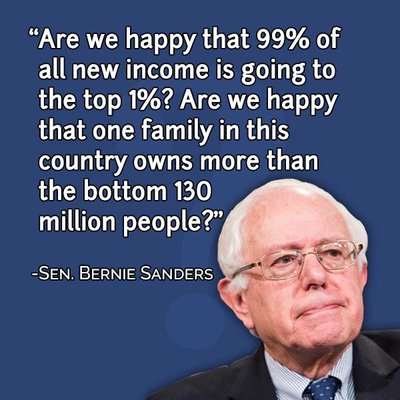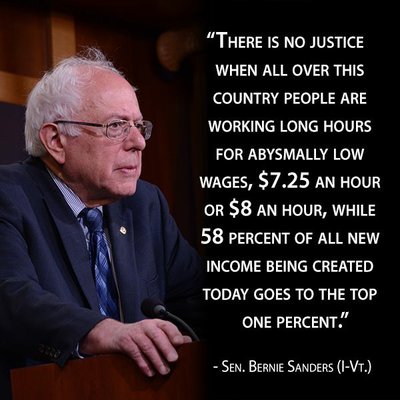
Posts: 5136
-
Karma: -1,030
(CNN)America is suddenly feeling "the Bern" -- the political momentum that seems to be lifting Bernie Sanders, who is drawing huge crowds wherever he goes, including roughly 28,000 fans in Portland and another 28,000 in Los Angeles. Celebrities such as Sarah Silverman and Mark Ruffalo are singing his praises, and California rapper "Lil B The Based God" this week pulled away from Hillary Clinton and is endorsing Sanders.
Jay Parini
A recent Quinnipiac University poll suggests that the Vermont senator would handsomely best Donald Trump in a head-to-head national election in 2016, if they were the two left standing (although so would Clinton and Joe Biden). This is not surprising to those of us who know Sanders.
It's worth thinking about what this might look like: President Bernie Sanders.
I've lived in Vermont for nearly four decades, and I've watched Bernie (everyone here calls him Bernie) at work, listening to him carefully since he first won the mayor's job in Burlington in 1981. I've read his position papers, listened to many of his speeches and attended his town hall-type forums, even talked to him personally about the issues that concern him. Most Vermonters know him well, and we have a pretty good idea about what he might attempt to do in the Oval Office.
What does he say he'd do?
His laundry list of proposals includes campaign finance reform -- an issue he approaches with passion -- and a strong desire to fight climate change in real ways.
Rapper Lil B:
touched my heart
Rapper Lil B:
He also says he would find ways to make higher education more affordable.
With regard to Wall Street, he wants to break up the big banks and discourage high-risk investment strategies of the kind that brought down the U.S. economy in 2008.
He would push for a single-payer, universal health care system, not unlike what now exists in Canada, Europe and most developed industrial countries.
He would increase taxes on the wealthiest 2% of Americans and work to alleviate the tax burden for the middle class.
On foreign policy, he would avoid sending troops to the Middle East or anywhere else, except when the United States is directly threatened.
On guns, he would reach for a middle ground, supporting hunters, finding ways to discourage the use of semi-automatic weapons and handguns.
He laid out these proposals, and many others, when he announced his candidacy in the spring.
But he has also more recently addressed such issues as the racial divide in this country and immigration, even though a number of activists from the Black Lives Matter movement in Seattle recently shut him down on stage. It is strange to silence a voice like his, as Sanders has been a campaigner for racial justice since his college days and has released a comprehensive racial justice platform.
And he has outlined positions on immigration that go beyond President Barack Obama's efforts, with sweeping reforms to the current, broken system. He supported the failed federal Dream Act, which would have given temporary legal status to many undocumented young people who came to the United States, and he has been vocal about the exploitation of undocumented immigrants, noting that they often live in "unspeakably inhumane conditions" with scant access to medical care. But he has also in the past resisted some aspects of immigration reform, such as guest worker programs, out of concern, he said, that American workers would be affected.
Sanders drawing huge crowds, closing on Clinton
Sanders drawing huge crowds,
Still, in all, his platforms on key issues are breathtaking in their ambition. But can he deliver?
Let's look at how he has fared in Vermont. He has, in fact, been an outspoken, bold and effective senator.
To members of Congress, like him, of course, some of the larger goals -- such as campaign finance reform -- remain out of easy reach. The Supreme Court's 2010 decision in the Citizens United case, which opened the floodgates to an unprecedented surge of outside money into electoral politics, saw to that.
Nevertheless, in December Sanders introduced a bill of amendment to the U.S. Constitution attempting to roll back the decision in order to "protect the integrity and fairness of the electoral process." The bill failed, but it is worth reading it carefully, as it provides a blueprint for changing the system in ways that will allow ordinary citizens an equal voice in elections.
On climate change, Sanders joined with Sen. Barbara Boxer to propose charging corporations for their carbon emissions and says he would use these fees to bolster green technology. He has slammed those, such as Sen. Jim Inhofe, who deny that any problem exists. Says Sanders: "The bottom line is that when Senator Inhofe says global warming is a hoax, he is just dead wrong, according to the vast majority of climate scientists."
On economic matters, Sanders -- a self-declared "democratic socialist" -- has never minced words, showing a disdain for big banks that ignore the needs of ordinary people.
In 2014, from the floor of the Senate, he declared: "If Wall Street lobbyists can literally write a provision into law that will allow too-big-to-fail banks to make the same risky bets that nearly destroyed our economy just a few years ago, it should be obvious to all that their incredible economic and political power is a huge danger to our economy and our way of life."
And Sanders has long advocated taxing the wealthiest Americans and lessening the tax burden on the middle class -- as in a classic Sanders takedown to the Senate Budget Committee over the Republican myth about "job creators" deserving huge tax breaks. As he put it, "The real job creators are those millions of Americans who every day go out and purchase goods and services -- and if they don't have adequate income, the economy suffers."
By contrast, Sander's Republican rivals mainly want to lower taxes on the rich, touting "trickle down" economics, an idea that was popular on the right under President Ronald Reagan. This argument runs that if the wealthy succeed, their money creates jobs and ultimately seeps down into the pockets of the less fortunate. But even the right-leaning Forbes magazine has discredited the idea.
On foreign policy, Sanders' record is consistent. Indeed, he opposed the Iraq War form the outset.
Here is what he said before the critical vote in 2003 representing perhaps the worst foreign policy decision in American history: "Mr. Speaker, I do not think any member of this body disagrees that Saddam Hussein is a tyrant, a murderer, and a man who has started two wars. He is clearly someone who cannot be trusted or believed. The question, Mr. Speaker, is not whether we like Saddam Hussein or not. The question is whether he represents an imminent threat to the American people and whether a unilateral invasion of Iraq will do more harm than good."
It's worth watching the whole speech on video, as it shows what sort of man we have in Bernie Sanders: A brave and sensible patriot, I would argue, who would carefully weigh his decisions in the Oval Office, never shooting before he talks.
He has also been sensible on gun control, supporting the right of rural people to have guns for hunting. "We have millions of people who are gun owners in this country -- 99.9% of those people obey the law," Sanders recently said. "I want to see real, serious debate and action on guns, but it is not going to take place if we simply have extreme positions on both sides. I think I can bring us to the middle."
Who is Bernie Sanders?
Who is Bernie Sanders?
Somewhere in the middle on gun control? Well, there it is.
I don't doubt the difficulties a President Sanders would face from his first day in office.
There would be massive opposition to his ideas on many fronts, from the Supreme Court to Congress to the tea party to even some on the left. The wealthiest 2% would squeal, as would major corporations, and they would fund lobbyists who would attempt to fight any legislation that threatened business as usual, which has worked very well for those in the highest tax brackets, although not so well for those below them.
But as Americans will vividly learn when the Democratic Party debates begin, Bernie Sanders is extremely smart and well-informed. And he doesn't back down in a fight. Vermonters already know this.
As president, he would take his agenda to the country and without flinching. And he might just convince Americans to support legislation that would actually benefit them in the long run and even in the short run.




















